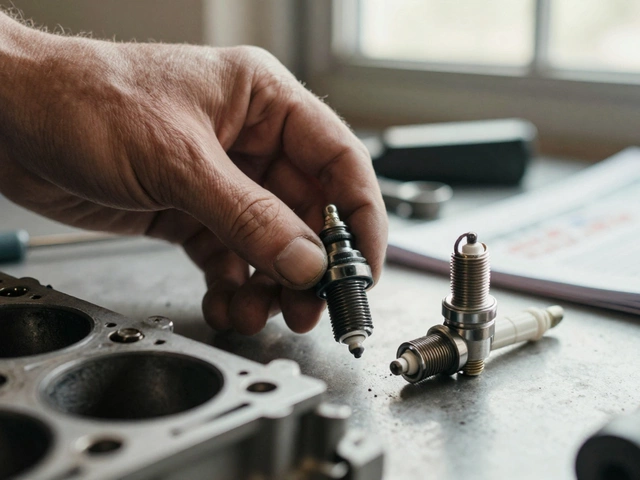Spark plugs might seem like small players in the world of engines, but they pack a punch in terms of their function and impact on performance. They're tasked with igniting the air-fuel mixture in the engine's cylinders, kick-starting the process that propels vehicles forward. But as tiny as they are, the question of their lifespan is not so small.
Can a spark plug really stick around for ten years doing its job effectively? Like any other part of a vehicle, its duration depends on a slew of things ranging from driving habits to the type of vehicle engine it serves. As technology has evolved, so have the materials and designs of spark plugs, which makes for an intriguing discussion on whether they can indeed last a decade.
- Understanding Spark Plugs
- Standard Lifespan of Spark Plugs
- Factors Affecting Durability
- Signs It's Time for Replacement
- Tips for Prolonging Lifespan
Understanding Spark Plugs
In the world of automotive maintenance, spark plugs might not always steal the spotlight, but their role is nothing short of critical. These compact marvels nestle inside the engine, each responsible for creating the tiny spark that ignites the air-fuel mixture within the combustion chamber. This process is a cornerstone of engine operation, turning chemical energy into the mechanical energy that powers vehicles. Without properly functioning spark plugs, an engine might sputter, underperform, or even stall completely. In essence, spark plugs are tiny but mighty components that make vehicles go, appealing both to car enthusiasts and casual drivers alike.
Spark plugs weren't born overnight. They have a rich history that dates back to the late 19th century, thanks to inventors Nicolas Tesla, Nikolaus Otto, and the Lodge brothers. Since then, they've undergone significant evolution in design and materials. Earlier versions were quite basic compared to today's high-performance variations, which may include fine metal components like iridium or platinum. These materials are not just for show; they enhance durability and improve the performance of the plug, therefore benefiting energy efficiency. This evolution reflects the constant push in the automotive industry toward innovations that ensure optimal efficiency.
Digging deeper into their anatomy, modern spark plugs consist of a center electrode, a ground electrode, ceramic insulation, and a terminal. The center electrode carries the spark's heat, supported by an insulating shell that ensures the spark fires at the right angle and voltage. The ground electrode, meanwhile, provides a pathway for the spark discharge. Manufacturers test these components rigorously to endure extreme conditions of heat, pressure, and chemical exposure, kind of like how athletes are tested to perform under stress. As they seal gaps and redirect energy, the assembly endeavors to maintain efficiency in ignition operations decade after steady decade.
"The impact of a spark plug on engine performance cannot be overstated. It's about improving both power and efficiency," acknowledges Dennis McCarthy, automotive engineer and creator of custom cars for the Fast and Furious franchise.
Understanding the importance of spark plugs is the first step towards appreciating vehicle maintenance. As guardians of the ignition sequence, their presence cannot be ignored. Many enthusiasts believe that maintaining spark plugs can drastically enhance the lifespan of a vehicle. But how long does this tiny yet pivotal component last? This question, while seemingly straightforward, presents multiple facets. As automobile technologies continue to rise, it's crucial to consider the entire ecosystem in which spark plugs operate, their specifications, the demands of modern engines, and potential upgrades.
Standard Lifespan of Spark Plugs
When it comes to spark plugs lifespan, the general consensus among automotive experts and manufacturers is that a set of high-quality plugs can last approximately 20,000 to 30,000 miles. This equates to roughly two to three years for the average driver. However, advancements in materials like platinum and iridium have extended this duration significantly, in some cases up to 60,000, 100,000 miles, or more. These high-performance options are designed to withstand greater thermal stress, making them increasingly popular among modern drivers.
Every vehicle model presents its own specifications regarding spark plug replacement intervals, often outlined in the owner's manual. For instance, many Toyota and Honda models recommend changing the spark plugs between 60,000 and 100,000 miles. Meanwhile, some high-performance or turbocharged engines might require more frequent changes due to the increased demand placed on the engine's components. Keeping an eye on these guidelines can ensure your vehicle remains in peak condition.
There are varied factors at play that can influence how long spark plugs last in real-world conditions. Driving habits, for instance, can greatly impact their lifespan. Frequent short trips where the engine never truly warms up can lead to quicker wear and tear. Additionally, a poorly maintained engine or low-quality fuel can also cause spark plugs to degrade faster. Then there's the role of climate; extreme temperatures, whether hot or cold, might hasten the aging process of spark plugs.
"While high-end spark plugs boast impressive mileage capabilities, it is essential to consider the specifics of your vehicle and driving habits," says Amanda Reed, an automotive technician with over two decades of experience. "Sometimes the rule of thumb is not about reaching a particular milestone but ensuring your engine's efficiency and performance are not compromised."
The role of platinum and iridium cannot be overstated in the quest for longer-lasting spark plugs. These materials are more resistant to wear and tear, offering superior conductivity and durability. While these options tend to carry a higher price tag, their longevity and performance benefits often justify the initial investment.
Understanding the spark plugs lifespan is not merely a matter of observing milage but respecting the intricate demands of your vehicle's engine. Routine checks and adhering to maintenance schedules go a long way in ensuring that your spark plugs perform optimally throughout their service life. This proactive approach can help maximize your vehicle's efficiency and power, prolonging the health of your engine in the long run.

Factors Affecting Durability
When it comes to understanding how long a spark plug might last, several key elements come into play, shaping its lifespan and functionality. A critical determinant is the type of material used in the spark plug's construction. Copper, platinum, and iridium are commonly used, each offering different levels of performance and longevity. Copper spark plugs, while excellent at conducting electricity, tend to wear out faster than their platinum and iridium counterparts, often requiring replacement around the 20,000 to 30,000-mile mark. In contrast, platinum and, particularly, iridium spark plugs can push the boundary over 60,000 to 100,000 miles, making them more suited for those desiring long-lasting performance.
Another aspect contributing to a spark plug's lifespan is the driving conditions the vehicle regularly encounters. Frequent stop-and-go traffic, common in city driving, can lead to more rapid wear compared to highway driving where the engine runs at a steady pace. Alongside, the general maintenance habits play a huge role as well. Regular engine tune-ups, which often include checking and potentially replacing spark plugs, can help sustain optimal engine performance and prolong the life of these small yet crucial components. As any mechanic would agree, neglecting routine maintenance is a surefire way to reduce the functional lifespan of spark plugs.
"It's not just about the type of plug, but how well you maintain the entire engine," notes John O'Donnell, an experienced automotive technician with over three decades in the field. "Even the best iridium spark plug won't last if the engine isn't taken care of properly."
The kind of fuel used also influences spark plug durability. Poor-quality fuel can contain impurities that foster build-up on the electrodes, reducing efficiency and likely necessitating earlier replacement. Quality fuels from reputable sources often lead to a longer-lasting spark plug. The engine's condition is another pivotal factor. An engine with oil leaks can cause oil to seep into the combustion chamber, fouling the spark plugs with oil residue, thereby impairing their ability to generate a spark. Ensuring your engine is in good health is synonymous with safeguarding the longevity of your spark plugs.
Additionally, the engine's tuning settings themselves can impact spark life. Engines running too rich or lean can strain the plugs, causing them to work overtime and wearing them out faster. Modern cars often have systems to alert drivers of such imbalances, but it's best never to ignore the tell-tale signs: a rough idle, misfires, or a noticeable dip in fuel economy can all signal that the engine and its spark plugs are out of sync. It’s key to heed these alerts and act promptly.
Signs It's Time for Replacement
Recognizing when it’s time to replace your spark plugs can save you trouble and keep your car running smoothly. A well-maintained engine starts with effective ignition, and as spark plugs wear out, their performance can significantly dip, impacting your driving experience. So, maintain attention to these subtle but crucial hints your vehicle might give you. One of the most apparent indications is a drop in fuel efficiency. When spark plugs are nearing the end of their lifespan, they struggle to ignite the fuel completely, leading to more trips to the gas station.
Engine misfires are another telltale sign. This issue often leads to unusual sounds from under the hood and might create vibrations when driving at low speeds. Often, these misfires are sporadic in the beginning but become more frequent as the spark plugs continue to degrade. If your engine is hesitating or you notice a sudden loss of power, it might be time for a closer look at those plugs. A thorough diagnostic should be performed to ensure that the misfire isn’t due to other causes like faulty ignition wires or a malfunctioning fuel injector.
Strange noises during engine start could also indicate worn-out plugs. These noises might appear as persistently loud clicking or knocking sounds, often combined with hard starts. Though these might not always compromise vehicle safety outright, they may lead to more severe engine damage over time. Persistent knocking can increase engine temperature, putting additional stress on other components. Therefore, addressing these signs promptly can prevent more considerable, costlier repairs.
Don’t forget the significance of the ignition history. If you experience difficulty starting your car, it might signal that a replacement is required. Ignition troubles are particularly noticeable in colder weather when spark plugs need to exert more effort. If this is a constant concern, you should inspect the spark plug's electrodes for excessive wear or corrosion. Some superior-quality plugs tend to wear evenly, showcasing minimal visible damage while substantially losing efficiency.
"Regular maintenance schedules help prevent major breakdowns and expensive repairs," suggests the Car Care Council.
Lastly, increased vehicle emissions and a rough idle can often be traced back to spark plugs. A poorly performing set of plugs might result in excessive smoke from the exhaust, which could lead to failing emission tests. All these warning signs are ways your car communicates the need for attention to spark plugs. Being proactive by regularly checking the plugs and tracking mileage ensures your engine runs with the efficiency it deserves.
Given all these indications, it stands to reason that periodic inspections and timely replacements can not only enhance performance but also extend the life of other crucial components in your engine. Spark plugs are the unsung heroes of the ignition system, and acknowledging their role when these signs crop up is imperative for a healthy automotive life.

Tips for Prolonging Lifespan
Keeping your spark plugs in tip-top shape isn't just about checking them off a list. It's about embracing a series of consistent practices that serve your vehicle in the long run. The first golden rule is regular maintenance check-ups. When your vehicle goes for a routine check, the spark plugs should also get some attention. A seasoned mechanic knows how to spot an ailing plug and provide corrective action before it snowballs into a more costly problem. Don't put off these routine checks. It might be tempting to skip one here and there to save a buck, but it eventually leads to oversized repair bills, or even worse, engine damage.
Pondering about driving habits can also be a great motivator for extending spark plugs lifespan. Aggressive driving with rapid acceleration and sudden braking doesn't do favors for spark plugs, as it puts a strain on the engine. Instead, maintaining a steady and moderate speed can ease the wear and tear, not just on the plugs, but across several engine components. One of the lesser-known facts is that spark plug health can directly relate to fuel efficiency. Adequately maintained plugs keep the engine firing properly, which means fuel burns cleaner, and you get more miles to the gallon.
Avoiding cheap alternatives is essential when it comes to replacing them. The market is flooded with products, but not all spark plugs are created equal. Investing in high-quality or recommended replacements specific to your vehicle model can ensure durability. Upgrading to iridium or platinum-tipped plugs might cost more upfront, but they generally last longer and perform better under pressure.
Certain vehicles benefit from periodic cleaning of spark plugs, a task easily undertaken if you're a bit hands-on with engines. Carefully removing the plug, cleaning off deposits with a wire brush, ensuring accurate re-gapping if needed, and reinstalling can breathe new life into them. But heed caution - over-cleaning or incorrect handling can cause more harm than good. As Geoff Hancock, an automotive aficionado with decades of experience under his belt, puts it, "Treat your vehicle spark plugs as if they were diamonds—handle with the utmost care."
Technology today provides us with options like OBD-II scanners that check for misfires and pinpoint potential spark plug issues. If you're a tech-savvy car owner, using such tools can give insights into minor problems before they escalate. It takes a concerted effort to ensure engine performance doesn't drop off suddenly and inevitably affect the longevity of spark plugs.
In embracing these proactive habits, you'll quickly notice that much of vehicle maintenance plays a groundwork role in extending the lifespan of spark plugs. These small but vital shifts can lead to larger savings over time—on both money and stress. Not only will the engine reward you with seamless operation, but it could also be your ticket to snagging that ten-year mark with those tiny performers tightly clutched under the hood.






